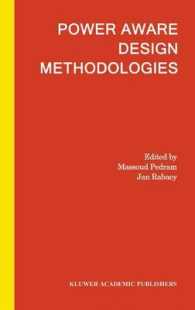Full Description
This comprehensive Handbook serves as a unique synthesis and resource for understanding how analytical frameworks developed within the literature assist in understanding the nature and management of commons resources. Such frameworks include those related to Institutional Analysis and Development, Social-Ecological Systems, and Polycentricity, among others. The book aggregates and analyses these frameworks to lay a foundation for exploring how they apply according to scholars across a wide range of disciplines. It includes an exploration of the unique problems arising in different disciplines of commons study, including natural resources (forests, oceans, water, energy, ecosystems, etc), economics, law, governance, the humanities, and intellectual property. It shows how the analytical frameworks discussed early in the book facilitate interdisciplinarity within commons scholarship. This interdisciplinary approach within the context of analytical frameworks helps facilitate a more complete understanding of the similarities and differences faced by commons resource users and managers, the usefulness of the commons lens as an analytical tool for studying resource management problems, and the best mechanisms by which to formulate policies aimed at addressing such problems.
Chapter 26 of this book is freely available as a downloadable Open Access PDF at http://www.taylorfrancis.com under a Creative Commons Attribution-Non Commercial-No Derivatives (CC-BY-NC-ND) 4.0 license.
Contents
1. Introduction: Commons Analytical Frameworks and Case Studies Part I: theoretical frameworks and alternative lenses for analyzing commons 2. Bridging Analytical Frameworks and Disciplines to Which They Apply 3. Using the Ostrom Workshop Frameworks to Study the Commons 4. Polycentricity 5. Connecting Commons and the IAD Framework 6. Anticommons Theory 7. Knowledge Commons 8. Commons Storytelling: Tragedies, Comedies, and Tragicomedies 9. Common-pool Resource Appropriation and Conservation: Lessons from Experimental Economics 10. Humanistic Rational Choice: Understanding the Fundamental Motivations that Drive Self-Organization and Cooperation in Commons Dilemmas Part II: commons interdisciplinary case Studies 11. The US Public Lands as Commons 12. Water Commons: A Critical Appreciation and Revisionist View 13. Commons Analysis and Ocean Fisheries 14. Coastal Commons as Social-ecological Systems 15. Climate as a Commons 16. Governing Wildlife Commons: Wild Boars, Wolves, and Red Kites 17. Ecosystem Services as Commons? 18. Urban commons of the Global South: Using multiple frames to illuminate complexity 19. Ostrom in the City: Design Principles and Practices for the Urban Commons 20. Infrastructure and its Governance: The British Broadcasting Corporation Case Study 21. Medical Information Commons 22. Ethical Standards for Unconsented Data Access to Build Genomic and Other Medical Information Commons 23. Technology Dependent Commons 24. From Historical Institution to pars pro toto: the Commons and Their Revival in Historical Perspective 25. Customary Authority and Commons Governance 26. The Role of Pseudo-Commons in Post-Socialist Countries 27. Facilitated Self-Governance of the Commons: On the Roles of Civil Society Organizations in the Governance of Shared Resource Systems 28. Commons, Indigenous Rights, and Governance 29. Globalization, Local Commons, and the Multiscale Ecosystem Framework (MEF) Part III: A global context 30. Bigger Issues in a Smaller World: The Future of the Commons 31. Protecting the Global Commons: The Politics of Planetary Boundaries







